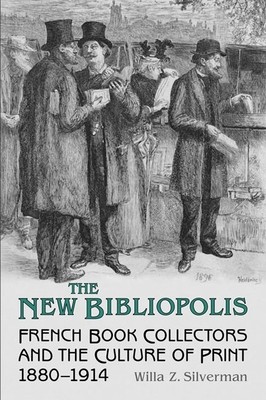
- We will send in 10–14 business days.
- Author: Willa Z Silverman
- Publisher: University of Toronto Press
- ISBN-10: 1442616083
- ISBN-13: 9781442616080
- Format: 15.2 x 22.6 x 2.3 cm, softcover
- Language: English
- SAVE -10% with code: EXTRA
Reviews
Description
The late-nineteenth century in Europe was a period of profound political, social, and technological change. One result of these changes was the rise in France of an upper-bourgeois bohemian class. Many of its members stimulated interest in unique forms of artistic expression such as illustrated books. On account of their influence, an atmosphere of intense bibliophilic activity came to define French culture at the turn of the century. The New Bibliopolis explores the role of amateurs in promoting the book arts in France during this period.
Drawing on extensive original research, Willa Z. Silverman looks at the ways in which book collectors supported print culture. She shows how, through the admiration demonstrated by collectors for this medium, print came to be a crucial part of popular conceptions of aesthetics. As collectors, publishers, authors, designers, and directors of bibliophile societies, reviews, and small presses, these book lovers became passionate and prolific interlocutors of the printed word in a uniquely artistic epoch. Silverman analyzes subjects as diverse as the relationship between book collecting and aesthetic and cultural currents such as Symbolism; the gendered nature of book collecting; the increased collaboration between authors and illustrators; and the marketing of fine books at international exhibits.
The New Bibliopolis is an important contribution to the study of book history, French sociocultural history, and fine and decorative arts.
EXTRA 10 % discount with code: EXTRA
The promotion ends in 14d.01:19:23
The discount code is valid when purchasing from 10 €. Discounts do not stack.
- Author: Willa Z Silverman
- Publisher: University of Toronto Press
- ISBN-10: 1442616083
- ISBN-13: 9781442616080
- Format: 15.2 x 22.6 x 2.3 cm, softcover
- Language: English English
The late-nineteenth century in Europe was a period of profound political, social, and technological change. One result of these changes was the rise in France of an upper-bourgeois bohemian class. Many of its members stimulated interest in unique forms of artistic expression such as illustrated books. On account of their influence, an atmosphere of intense bibliophilic activity came to define French culture at the turn of the century. The New Bibliopolis explores the role of amateurs in promoting the book arts in France during this period.
Drawing on extensive original research, Willa Z. Silverman looks at the ways in which book collectors supported print culture. She shows how, through the admiration demonstrated by collectors for this medium, print came to be a crucial part of popular conceptions of aesthetics. As collectors, publishers, authors, designers, and directors of bibliophile societies, reviews, and small presses, these book lovers became passionate and prolific interlocutors of the printed word in a uniquely artistic epoch. Silverman analyzes subjects as diverse as the relationship between book collecting and aesthetic and cultural currents such as Symbolism; the gendered nature of book collecting; the increased collaboration between authors and illustrators; and the marketing of fine books at international exhibits.
The New Bibliopolis is an important contribution to the study of book history, French sociocultural history, and fine and decorative arts.


Reviews